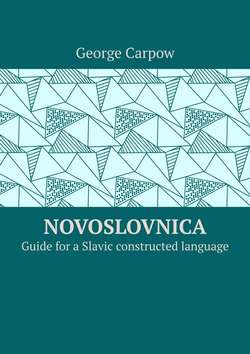Читать книгу Novoslovnica. Guide for a Slavic constructed language - George Carpow - Страница 13
Phonology
Alternation
ОглавлениеAlternation is a very important feature of Slavic languages. All of them provide some cases, when one letter changes to another one (s) and controversially. The cause is the fact that some sound combinations are difficult to be spoken or not comfortable for that. For example, Slavs can say «napisati» (to write), but «napišut» (they (will) write). The variant «napisut» is not comfortable to pronounce and, moreover, it is not understandable. What are you speaking – «to write» with hardened T or «they write» with depalatalized S. So you can see, that these rules are often experimental and cannot be explained in a common way.
Alternation can be found mostly in conjugation or declension of the word, because the process is in changing uncomfortable forms to better ones while changing the base and endings of the word.
In this paragraph we will speak about different examples of vowel and consonant palatalization. Let us begin with the consonants.
Alternation S//Š
This alteration appears in words with the letter S before a vowel A. The basic sound is S, which changes to Š before vowels I, E and in some cases before A in conjugation. Let’s look at examples to understand how it works.
Examples:
Pisati (write) [`pɪsatɪ] – piši [pɪ`ʂɪ]
Vysok (tall) [vɨ`sok] – povyšati [po`vɨʂatɪ] (to increase)
Alternation K//Č
This alteration appears in words with the letter K before a vowel A without a following vowel. The basic sound is K, which changes to Č before vowels Ě, N. Let us look at examples to understand how it works.
Examples:
Věk [vek] – věčen [`vet̠ʃɛn]}
Vëlïk [`ve̞lik] (Big) – vëlïčina [`ve̞lit̠ʃɪna] (Measure)
Alternation C//Č
This alteration appears in words with the letter C before a vowel A. The basic sound is C, which changes to Č before vowels I, E. Let us look at examples.
Examples:
Ptica (bird) [`ptɪtsa] – ptičen (birdish) [`ptɪt̠ʃɛn]
Věnec [`venɛts] (Crown) – Věnčati [`vent̠ʃatɪ] (To crown)
Alternation D//Đ
This one appears in words with the letter D before a vowel I. This consonant changes to Đ before vowels A, E and U. Let us look at the examples.
Examples:
Voditi (drive) [`vodɪtɪ] – vođati [`voɖʐatɪ]
Roditi [`rodɪtɪ] (bare) – rođati [`roɖʐatɪ]
Alternation Ǐ//J
This alternation is very simple. We write Ǐ before a consonant or in the end of the word and we write J before a vowel. The exception is the case, when we write Ǐ in the end of the word, but the first letter of the next word is a vowel – then we pronounce J, but write Ǐ.
Examples:
Môǐ (my) [mʊj] – moja [`moʝa]
However, not only consonants can change in the word when we conjugate or decline it. There are some alterations of vowels too.
Alternation Ò//-
This alternation appears in some old roots (see next paragraph).
Examples:
Tòk (stick) [tək] – tkati [`tkatɪ] (to weave)
Alternation E//-
This alternation is similar to the previous ones, but exist in word suffixes.
Examples:
Krasen (Nice) [`krasɛn] – krasna [`krasna]
Alternation Ę//En
This alternation is rather narrow, because it is used in the case of declension nouns of type 3 (look paragraph about noun declension), when the nasal vowel [ɛ̃] alternates to non-nasal pair of vowel «E» and consonant «N» (non-nasal!). To understand it look at the example
Examples:
Vremę (time) [`vrɛmjɛ̃] – vremenï [`vrɛmɛɲi]
Plemę (tribe) [`plEmjɛ̃] – plemenï [`plɛmɛɲi]
In the conclusion of this paragraph it should be mentioned that alterations are very important in Slavic languages and Novoslovnica as well. You can use reproduction in your speech as a recommended feature, while alterations are complimentary in this language. As it was noted before, we cannot ignore anything that can bring a misunderstanding in our speech.
